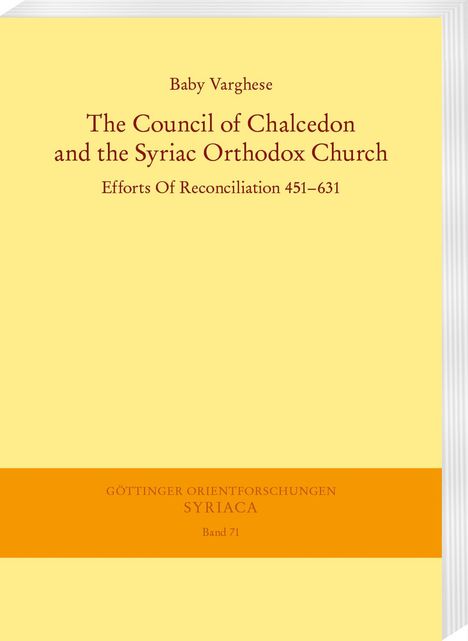Baby Varghese: Varghese, B: Council of Chalcedon and the Syriac Orthodox Ch, Flexibler Einband
Varghese, B: Council of Chalcedon and the Syriac Orthodox Ch
Lassen Sie sich über unseren eCourier benachrichtigen, falls das Produkt bestellt werden kann.
- Verlag:
- Harrassowitz Verlag, 02/2025
- Einband:
- Flexibler Einband
- ISBN-13:
- 9783447123303
- Gewicht:
- 440 g
- Maße:
- 238 x 168 mm
- Stärke:
- 18 mm
- Erscheinungstermin:
- 15.2.2025
Ähnliche Artikel
Klappentext
The Council of Chalcedon and the Syriac Orthodox Church traces the history of the anti-Chalcedonian movement until the advent of Islam. The Council of Chalcedon (451) caused a major schism in Eastern Christianity, which has not yet been healed, although the efforts for reconciliation began after just a few decades. The Eastern Christians who rejected the Council of Chalcedon were dominant groups in West Asia and Egypt. In the course of time, Ethiopians, Armenians and the Indians (Malankara Orthodox St Thomas Christians) joined the anti-Chalcedonian group. The reason for the rejection of Chalcedon was mainly the 'Christological two-natures formula', which rather had a resonance of Antiochene Christology as followed by Nestorians. However, in the course of the sixth century, when efforts for reconciliation failed, the anti-Chalcedonians were labeled as 'Monophysites' implying that they followed the heresy of Eutyches, which they had always denied. In order to heal the schism, the Byzantine Emperors organized several discussions between the two sides from 45 to 631 or issued decrees. Both sides adopted an intransigent attitude. The question of union became complex with the emergence of more than a dozen of groups among the anti-Chalcedonians. The predominant group among them were the Julianists, whose teachings seem to have been popular both in the monastic circles in Egypt and among the Arab Christians. 'Julianism' had left traces of influence on the Qur'anic understanding of Christ.




